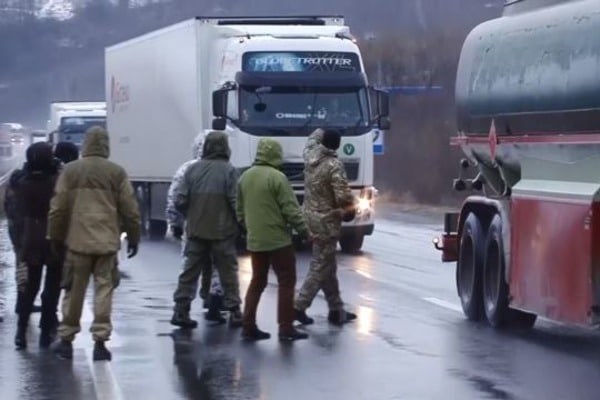Ukrainian activists resume blockade of Russian trucks
The Freedom Party has resumed the blockade of Russian trucks who are currently on Ukrainian territory. The leader of the organization, Oleh Tyahnybok, confirmed this on Facebook.
“It is unacceptable that the government is allowing Russian businesses to use the Ukrainian transport infrastructure. It undermines the faith of the Western allies who believe in Ukraine’s intentions to actually confront the aggressor, as well as the desire to continue the sanctions against Russia. The actions of authorities have once again demonstrated that for them, business takes priority over the national interests of Ukraine,” Tyahnybok posted.
The Freedom Party has requested that Ukrainian Prime Minister, Arseniy Yatsenyuk, prohibit the transit of Russian trucks through Ukrainian territory. The party has also asked Yatsenyuk to cancel the decision to restore Russian transit.
Tyahnybok also noted that the proposal to provide smooth passage to Russian trucks is unacceptable. This was to be implemented with the help of the National Guard and other units of the Ministry of Internal Affairs.
On the 24th of February, Ukraine accepted the offer of the Russian Ministry of Transport to resume transit from the 25th of February. The Deputy Minister of Transport of the Russian Federation, Nikolay Asaul, has said that he expects a decision shortly with regard to the entry of new Russian trucks into Ukraine.
On February 16th, the Ministry of Transport confirmed that the movement of nearly 200 Ukrainian trucks in Russia was halted. Before this, the Ukrainian government had decided to suspend the movement of Russian trucks through Ukrainian territory. They did this in response to a similar decision made by Moscow.
The blockade started on the 11th of February in the Zakarpattia region. In the days that followed, activists from other regions joined the blockade. These regions included Zhytomyr, Rivne, Volyn, Lviv, Ivano-Frankivsk, Chernivtsi and Dnipropetrovsk, Chernigov, Sumy and the Vinnitsa region. The blockade was also supported by right-wing parties such as UNA-UNSO and Right Sector, as well as participants of the ATO.
